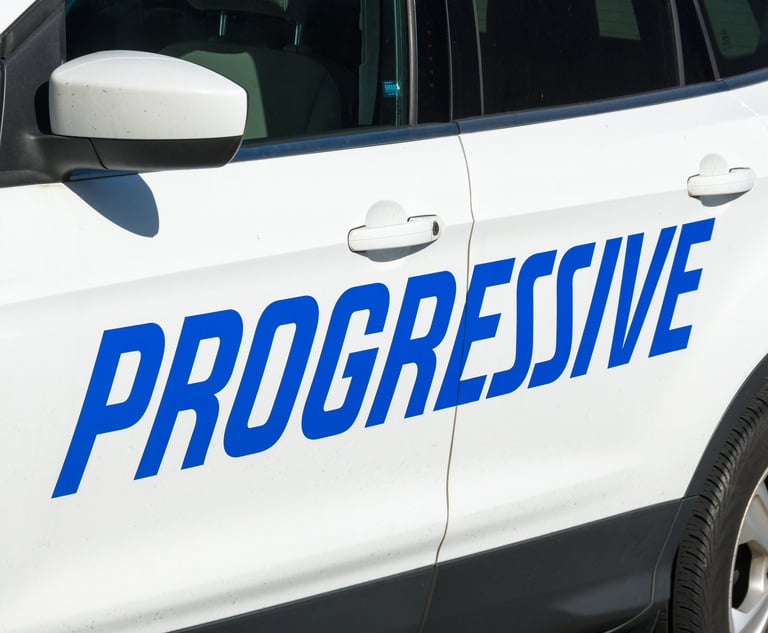 Cigna Corp. headquarters in Bloomfield. Photo: Michael Nagle/Bloomberg
Cigna Corp. headquarters in Bloomfield. Photo: Michael Nagle/BloombergFed. Judge Denies Cigna's Motion to Dismiss Class Action Alleging Overcharging
Cigna lost in its attempt to dismiss a prospective class action alleging it overcharged clients. The federal lawsuit against it now goes to the discovery phase.
August 31, 2018 at 01:19 PM
4 minute read
The original version of this story was published on Connecticut Law Tribune
A federal judge in Connecticut on Thursday denied Cigna Health & Life Insurance Co.'s motion to dismiss a potential class action alleging the mega-insurance company engaged in a scheme to defraud customers by overcharging them—in some cases more than 100 percent—for services and products.
U.S. District Judge Warren Eginton of the District of Connecticut let nine of 12 counts against Cigna stand, and ordered plaintiffs attorneys to file an amended complaint with the remaining nine claims within three weeks. The surviving claims against Cigna include allegations of violations of the Employment Retirement Income Security Act, or ERISA, and the Racketeering Influenced and Corrupt Organizations Act, or RICO.
In his 31-page ruling Thursday, Eginton wrote: “The complaint plausibly alleges that Cigna acted with scienter by alleging that it intentionally sought to charge excess amounts and that it required managers to conceal from the insureds [the overcharges].”
The overcharging alleged includes a blood test for Arizona resident Aubrey Srednicki, one of two named plaintiffs, which Cigna said cost about $17,000 when, in fact the test was only $471.
“This lawsuit is designed to stop those kinds of misrepresentations. This has been a pattern of theirs,” plaintiff attorney Craig Raabe told the Connecticut Law Tribune on Friday. “The plaintiffs have alleged a company-wide overcharge scheme that significantly inflated costs for many kinds of health care for years.”
Raabe, a partner with West Hartford's Izard, Kindall & Raabe, called the alleged overcharges “brazen.”
In his ruling, Eginton recited the allegations brought by Srednicki and Texas resident Jeffrey Neufeld. In outlining the plaintiffs' complaint, the judge said the accusations were plausible, but he did not necessarily say he was agreeing with them.
The complaint claims the insurance giant “violated the plans and breached its fiduciary duties by secretly determining that plaintiffs must pay inflated deductible and cost-sharing payments, and secretly collecting those inflated payments from plaintiffs.”
While the plaintiffs are from Arizona and Texas, the lawsuit was filed in Connecticut because Cigna is based in Bloomfield.
The suit outlines class members and sub-class members. Raabe said class members are Cigna-insured customers who were overcharged between October 2011 and October 2017, when the suit was filed. There are different sub-classes, Raabe said, “depending on the medical discipline and the intermediary that Cigna used. There are sub-classes that got overcharged through Cigna's intermediary.”
The prospective class, Raabe said, would have at least tens of thousands of people. The sub-classes, he said, would have less than the class.
The next step in the process, Raabe said, is to go through discovery, which could take at least one year. Then there are class certification proceedings, summary judgment proceedings and then trial. Raabe said it's too early to say how much the class would be seeking, but said it would be in the millions of dollars.
Cigna is represented by Joshua Simon of Kirkland & Ellis in New York City. Simon did not respond to a request for comment Friday.
In court papers filed in January, Cigna called the allegations outlined in the complaint “unsupported.”
“Each of the plaintiffs' claims suffer from a panoply of defects and cannot survive the motion to dismiss,” Cigna wrote in its motion to dismiss. “As a threshold issue, plaintiffs lack standing to bring the broad challenge regarding Cigna's nationwide provider network that they purport to assert.”
Cigna's motion continued: “Both plaintiffs use the guise of a putative class to attempt to assert claims related to Cigna's contractual arrangements with thousands, if not hundreds of thousands, of other providers who have nothing to do with plaintiffs' claims that are not alleged to have caused them any injury. Two other courts have rejected nearly identical attempts to skirt the constitutional standing requirement, and this court should do the same.”
This content has been archived. It is available through our partners, LexisNexis® and Bloomberg Law.
To view this content, please continue to their sites.
Not a Lexis Subscriber?
Subscribe Now
Not a Bloomberg Law Subscriber?
Subscribe Now
NOT FOR REPRINT
© 2024 ALM Global, LLC, All Rights Reserved. Request academic re-use from www.copyright.com. All other uses, submit a request to [email protected]. For more information visit Asset & Logo Licensing.
You Might Like
View All
Divided State Court Reinstates Dispute Over Replacement Vehicles Fees
5 minute read
Not a Shield, but a Weapon? Blue Cross Accused of Antitrust Practices
2 minute read
'Health Care Behemoth'?: DOJ Seeks Injunction Blocking $3.3B UnitedHealth Merger Proposal
3 minute read
Trending Stories
- 1Gibson Dunn Sued By Crypto Client After Lateral Hire Causes Conflict of Interest
- 2Trump's Solicitor General Expected to 'Flip' Prelogar's Positions at Supreme Court
- 3Pharmacy Lawyers See Promise in NY Regulator's Curbs on PBM Industry
- 4Outgoing USPTO Director Kathi Vidal: ‘We All Want the Country to Be in a Better Place’
- 5Supreme Court Will Review Constitutionality Of FCC's Universal Service Fund
Who Got The Work
Michael G. Bongiorno, Andrew Scott Dulberg and Elizabeth E. Driscoll from Wilmer Cutler Pickering Hale and Dorr have stepped in to represent Symbotic Inc., an A.I.-enabled technology platform that focuses on increasing supply chain efficiency, and other defendants in a pending shareholder derivative lawsuit. The case, filed Oct. 2 in Massachusetts District Court by the Brown Law Firm on behalf of Stephen Austen, accuses certain officers and directors of misleading investors in regard to Symbotic's potential for margin growth by failing to disclose that the company was not equipped to timely deploy its systems or manage expenses through project delays. The case, assigned to U.S. District Judge Nathaniel M. Gorton, is 1:24-cv-12522, Austen v. Cohen et al.
Who Got The Work
Edmund Polubinski and Marie Killmond of Davis Polk & Wardwell have entered appearances for data platform software development company MongoDB and other defendants in a pending shareholder derivative lawsuit. The action, filed Oct. 7 in New York Southern District Court by the Brown Law Firm, accuses the company's directors and/or officers of falsely expressing confidence in the company’s restructuring of its sales incentive plan and downplaying the severity of decreases in its upfront commitments. The case is 1:24-cv-07594, Roy v. Ittycheria et al.
Who Got The Work
Amy O. Bruchs and Kurt F. Ellison of Michael Best & Friedrich have entered appearances for Epic Systems Corp. in a pending employment discrimination lawsuit. The suit was filed Sept. 7 in Wisconsin Western District Court by Levine Eisberner LLC and Siri & Glimstad on behalf of a project manager who claims that he was wrongfully terminated after applying for a religious exemption to the defendant's COVID-19 vaccine mandate. The case, assigned to U.S. Magistrate Judge Anita Marie Boor, is 3:24-cv-00630, Secker, Nathan v. Epic Systems Corporation.
Who Got The Work
David X. Sullivan, Thomas J. Finn and Gregory A. Hall from McCarter & English have entered appearances for Sunrun Installation Services in a pending civil rights lawsuit. The complaint was filed Sept. 4 in Connecticut District Court by attorney Robert M. Berke on behalf of former employee George Edward Steins, who was arrested and charged with employing an unregistered home improvement salesperson. The complaint alleges that had Sunrun informed the Connecticut Department of Consumer Protection that the plaintiff's employment had ended in 2017 and that he no longer held Sunrun's home improvement contractor license, he would not have been hit with charges, which were dismissed in May 2024. The case, assigned to U.S. District Judge Jeffrey A. Meyer, is 3:24-cv-01423, Steins v. Sunrun, Inc. et al.
Who Got The Work
Greenberg Traurig shareholder Joshua L. Raskin has entered an appearance for boohoo.com UK Ltd. in a pending patent infringement lawsuit. The suit, filed Sept. 3 in Texas Eastern District Court by Rozier Hardt McDonough on behalf of Alto Dynamics, asserts five patents related to an online shopping platform. The case, assigned to U.S. District Judge Rodney Gilstrap, is 2:24-cv-00719, Alto Dynamics, LLC v. boohoo.com UK Limited.
Featured Firms
Law Offices of Gary Martin Hays & Associates, P.C.
(470) 294-1674
Law Offices of Mark E. Salomone
(857) 444-6468
Smith & Hassler
(713) 739-1250








